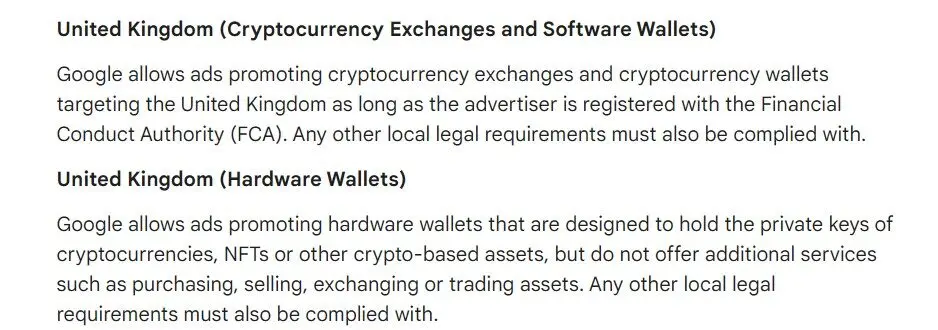Google announced that advertisers promoting crypto exchanges and software wallets in the UK must be registered with the FCA.
When a new Google policy update goes into effect in January 2025, Google ads that promote digital asset exchanges and wallets in the UK will have to register with the financial services regulator in that nation.
According to the search engine business, advertisers who provide cryptocurrency exchange goods and services in the UK will be permitted to advertise as of January 15, 2025, provided they fulfill specific criteria.
Google stated that if software wallets and cryptocurrency exchanges are registered with the Financial Conduct Authority (FCA), it will permit advertisements to promote these goods.

Google Requires Marketers To Abide By Local Regulations
Additionally, Google declared that it will allow advertisements for hardware wallets that are intended to hold private keys for cryptocurrencies, NFTs, or other digital assets, provided that these wallets do not offer extra services like trading, purchasing, or selling.
Google Ads expects advertisers to adhere to local laws, even though it did not outline any additional requirements for these hardware wallets. Google wrote:
“As a reminder, we expect all advertisers to comply with the local laws for any area that their ads target. This policy will apply globally to all accounts that advertise these financial products.”
This implies that marketers who wish to display cryptocurrency-related advertisements on Google must research local laws in the jurisdictions where they wish to place their ads and ensure that they comply with the standards established by local financial regulators.
Regulators Fight Illegal Cryptocurrency Promotions
The latest upgrade coincides with efforts by regulators to fight cryptocurrency-related advertising in their respective regions.
The FCA issued a warning on December 16 about the “Retardio” memecoin and NFT project, which is situated in Solana.
Concerns about illegal promotions aimed at UK consumers were raised by the regulator.
According to the regulator, customers involved in the project may not receive their money back if the business fails because the company is not registered.
The Securities and Exchange Commission (SEC) of Nigeria, meanwhile, strengthened its rules governing the promotion and marketing of cryptocurrency goods.
According to the SEC, social influencers and suppliers of virtual asset services need to obtain the agency’s consent before posting any cryptocurrency advertisements.



